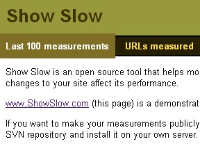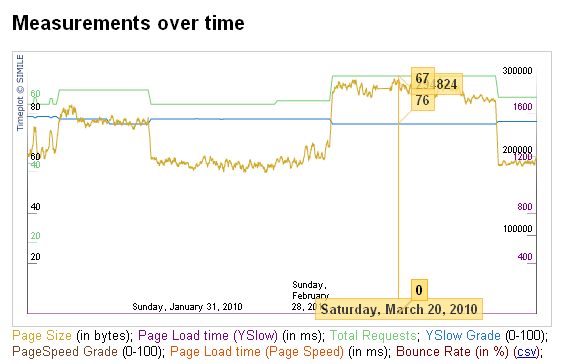Release 0.6 is packed with new stuff – first of all, smoothing that was originally implemented in JavaScript was too slow and got moved to server side in PHP code so now results are still smooth, but not clogging down the browser.
 Front-end performance is always a priority for ShowSlow project and all performance-related bugs have high priority so this was time to use SVN Assets. It means that all static assets will now have unique URLs based on their versions in Subversion. Make sure you look into config.sample.php and set $baseAssetURL variable accordingly (simplest approach is to set it to $showslow_base). Also make sure you have mod_rewrite, mod_expires and mod_deflate enabled in your apache.
Front-end performance is always a priority for ShowSlow project and all performance-related bugs have high priority so this was time to use SVN Assets. It means that all static assets will now have unique URLs based on their versions in Subversion. Make sure you look into config.sample.php and set $baseAssetURL variable accordingly (simplest approach is to set it to $showslow_base). Also make sure you have mod_rewrite, mod_expires and mod_deflate enabled in your apache.
 We also got some look and feel update and you can see uniform header and footer across all pages. You might notice a registration page, stay tuned for more news there. You probably also noticed that http://www.showslow.com/ got buttons for following on Twitter @showslow and like button from Facebook – don’t wait, please show your pride and help spread the word!
We also got some look and feel update and you can see uniform header and footer across all pages. You might notice a registration page, stay tuned for more news there. You probably also noticed that http://www.showslow.com/ got buttons for following on Twitter @showslow and like button from Facebook – don’t wait, please show your pride and help spread the word!
And last, but not least, now you can run WebPageTest.org tests right from details page. This feature was hacked together originally and had to be removed because of compatibility issues, but now it’s a solid integration using WebPageTest’s automation API! You can also configure it to run your own instance.
It’s a lot of changes and I hope you have no troubles upgrading, but if you do, don’t forget that you can always ask question on our mailing list here: http://groups.google.com/group/showslow



